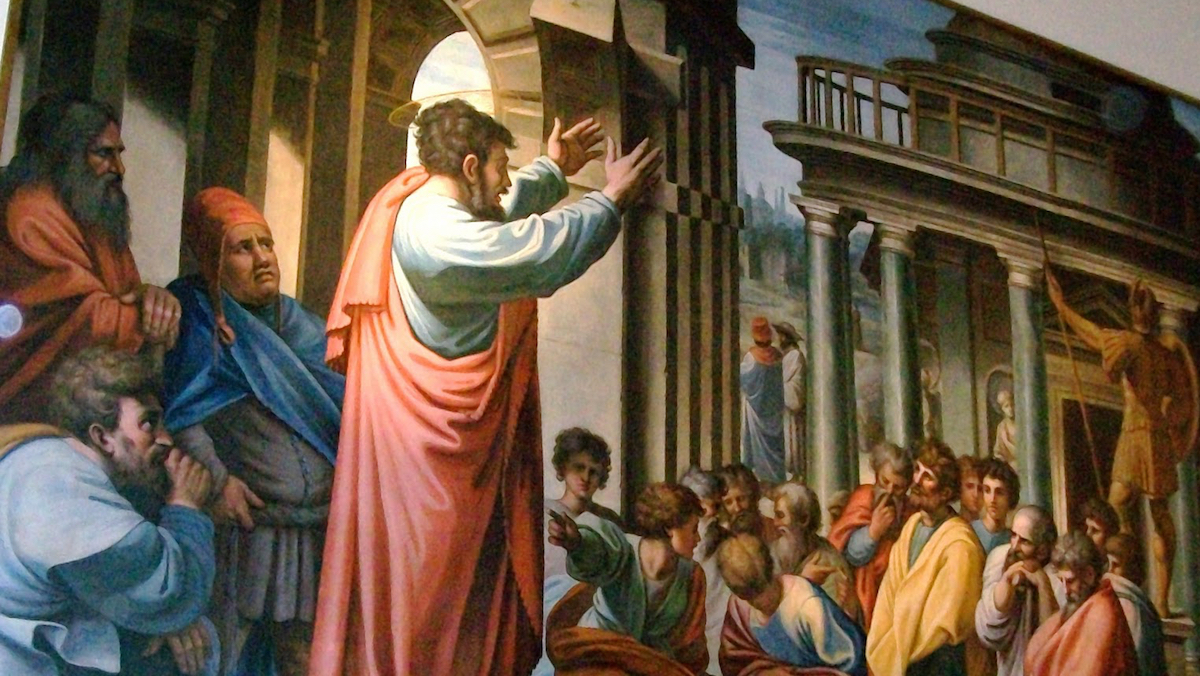 One of Aesop’s Fables tells of a contest between the wind and the sun, who wanted to see which one was the stronger. A man was walking along a deserted road, and the sun said to the wind, “Whoever can make that man remove his coat will be the winner.” The wind agreed, and decided to go first. It blew and blew and blew, but the harder it did, the more tightly the man clutched his coat. Finally the wind was exhausted, and had to give up. Then the sun took over, shining in all its glory. Within a few minutes, the man became very warm, and removed his coat—making the sun the contest’s winner. According to Aesop, the moral was this: you can achieve more by gentleness than by violence (Mark Link, S.J., Illustrated Sunday Homilies, Year A, p. 79).
One of Aesop’s Fables tells of a contest between the wind and the sun, who wanted to see which one was the stronger. A man was walking along a deserted road, and the sun said to the wind, “Whoever can make that man remove his coat will be the winner.” The wind agreed, and decided to go first. It blew and blew and blew, but the harder it did, the more tightly the man clutched his coat. Finally the wind was exhausted, and had to give up. Then the sun took over, shining in all its glory. Within a few minutes, the man became very warm, and removed his coat—making the sun the contest’s winner. According to Aesop, the moral was this: you can achieve more by gentleness than by violence (Mark Link, S.J., Illustrated Sunday Homilies, Year A, p. 79).
Jesus was a gentle person. He came to call sinners to repentance, not to condemn them; He prayed for His enemies, rather than cursing them; He responded to hatred not with more hatred, but with love. That’s a hard act to follow, but we’re called to try—for being gentle with others, especially when it’s not easy, is an important sign that we are indeed Christ’s followers.
All of us surely recognize the need for a proper balance in our relations with others; we need to be kind and caring, but sometimes the kindest thing we can do for another person is to oppose or correct him or her, occasionally using strong language to do so. Truth must be defended, even when it offends others; love must be practiced, even when it means disagreeing or telling someone “no.” The readings for the Fourteenth Sunday in Ordinary Time praise the virtue of gentleness, but without denying the importance of strength and endurance. These things, of course, are found most perfectly in Christ. Jesus says, “Come to Me, all you who labor and are burdened, and I will give you rest. Take My yoke upon you and learn from Me, for I am meek and humble of heart; and you will find rest for yourselves. For My yoke is easy, and My burden light.” If we follow Jesus we do indeed have a yoke to carry, and a burden to bear—for it’s not always easy or pleasant to be loving and faithful and forgiving; with Christ’s help, however, it is possible.
God is gentle with us even as He uses His strength on our behalf. The prophet Zechariah (9:9-10) announced that one day the Messiah would come after having conquered and subdued all Israel’s enemies; he would enter Jerusalem, however, not as a great and victorious warlord, but as a meek and humble king. God is strong enough that He can afford to be gentle. The same thing is meant to be true of us in a spiritual sense. In his Letter to the Romans (8:9, 11-13), St. Paul tells us that we have a spiritual life since the Spirit of God dwells in us. Therefore, we are not to live according to the flesh, symbolized by anger, harshness, insults, bitterness, and a desire for revenge; rather, we are to live according to the spirit, expressing gentleness, kindness, love, forgiveness, and mutual concern.
Once there was a boy named Joseph who was born with a crippled back. It didn’t look so bad when he was dressed, but when he took off his shirt it appeared very ugly. One day it was time for the annual physical, and he and all the other boys at school were standing in line, waiting to be examined by the school doctor. Joseph dreaded the moment when he’d have to reveal his deformity, and when he was called into the office, his hands shook as he removed his shirt. The doctor looked at him from across his desk for a moment, then came around, placed his hand on Joseph’s shoulder, and gently asked, “Son, do you believe in God?” When the boy answered, “Yes, sir,” the doctor said, “Good! The more you believe in Him, the more you can believe in yourself.” Then the doctor became very business-like and wrote something on the chart; when he stepped out of the room for a moment, Joseph peeked at it, expecting the worst. Instead he found that, under the heading of “Physical Characteristics,” the doctor had written, “He has an unusually well-shaped head.” The doctor had evidently realized Joseph was very sensitive about his deformed back, so he was very gentle with him—and this was an incident Joseph remembered with gratitude for the rest of his life (Link, op. cit., p. 80).
We have opportunities to be gentle—and when we use them, we can make a lasting impact. In the confessional, if someone admits to having been away from church for a long time, I have no right to be judgmental or to say, “Well, it’s about time you came here”; instead, it’s my duty to be gentle, saying, “God is happy to welcome you back.” If a child makes a silly mistake, which would be the more effective way to teach a lesson: to say “That was stupid—from now on pay attention!,” or to say “Things didn’t work out the way you expected, did they? Think about what happened so you can do better in the future.” I’m sure we all realize the latter approach will usually be more effective, and it’s easy to see why. When other people think we’re judging them unfavorably, or feel threatened or attacked by our words, they experience a need to defend themselves—either by counterattacking, sulking, or ignoring us. When that happens, it’s hard to communicate our message, no matter how important it is. When we’re gentle and respectful, however, people are less likely to feel threatened and more likely to actually hear us and respond in a favorable manner.
God’s message—and it’s a very important one—is that He loves us and wants us to respond to Him in the same manner. He doesn’t threaten us, and He doesn’t use harsh laws and regulations to control us. Instead, He proved His immeasurable love for us by sending His Son to suffer and die in our place. Jesus in turn calls us to freely accept the burden of following Him—for in His gentleness we find our peace.








